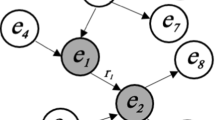Abstract
The power sector continues to accumulate a large amount of data resources, including relevant standard specifications, technical documents, management documents, fault resolution records. How to quickly query and intelligently search these documents is of great value for grid dispatching and fault recovery. The domain search system of traditional power grid is based on keywords, and has the problems of low precision and recall rate. It cannot understand the business language and cannot support semantic reasoning. This paper designs and implements a method based on knowledge mapping to construct the power domain semantic search system. Semantic knowledge extraction of unstructured data is carried out by intelligent domain segmentation technology, organized and stored as knowledge mapping, and semantic search for support reasoning is realized based on knowledge mapping. The process of constructing domain semantic search system is introduced. Experiments show that the accuracy rate and recall rate of the method have been greatly improved.








Similar content being viewed by others
References
MarieAngélique, L., Mougenot, I., & Eric, G. (2014). A semantic web faceted search system for facilitating building of biodiversity and ecosystems services. Lecture Notes in Computer Science, 85(74), 50–57. https://doi.org/10.1007/978-3-319-08590-6_5.
Mehare, D. D., & Deorankar, A. V. (2017). Implementation and evaluation of central keyword based semantic extension search scheme over encrypted outsourced data. IEEE Transactions on Information Forensics and Security, 1(1), 99–101.
Lashkari, F., Ensan, F., & Bagheri, E. (2017). Efficient indexing for semantic search. Expert Systems with Applications, 73(1), 92–114. https://doi.org/10.1016/j.eswa.2016.12.033.
Kejriwal, M., & Szekely, P. (2017). Knowledge graphs for social good: An entity-centric search engine for the human trafficking domain. IEEE Transactions on Big Data, 1(1), 39–46. https://doi.org/10.1109/TBDATA.2017.2763164.
Fu, Z., Xia, L., & Sun, X. (2018). Semantic-aware searching over encrypted data for cloud computing. IEEE Transactions on Information Forensics and Security, 1(1), 99–100. https://doi.org/10.1109/TIFS.2018.2819121.
Kem, O., Balbo, F., & Zimmermann, A. (2017). Multi-goal Pathfinding in cyber-physical-social environments: Multi-layer search over a semantic knowledge graph. Procedia Computer Science, 112(2), 741–750. https://doi.org/10.1016/j.procs.2017.08.162.
Bedmar, I. S., Martínez, P., & Martín, A. C. (2017). Search and graph database Technologies for Biomedical Semantic Indexing: Experimental analysis. JMIR Medical Informatics, 5(4), 48–49. https://doi.org/10.2196/medinform.7059.
Zemla, J. C., & Austerweil, J. L. (2017). Modelling semantic fluency data as search on a semantic network. Cogsci, 55(2), 3646–3651.
Kang, H., & Gong, Y. (2017). Developing a similarity searching module for patient safety event reporting system using semantic similarity measures. BMC Medical Informatics and Decision Making, 17(2), 75–86. https://doi.org/10.1186/s12911-017-0467-8.
Tiantian, D., & Peter, R. (2018). Comparison of semantic-based local search methods for multi-objective genetic programming. Genetic Programming and Evolvable Machines, 5(12), 49–56. https://doi.org/10.1007/s10710-018-9325-4.
He, L., Shao, B., & Xiao, Y. (2018). Neurally-guided semantic navigation in knowledge graph. IEEE Transactions on Big Data, 1(1), 99–102. https://doi.org/10.1109/TBDATA.2018.2805363.
Jian, C., Qingsheng, Z., & Cheng, Z. (2017). Search algorithm for QoS-aware semantic service composition. Computer Engineering & Applications, 62(7), 36–47.
Xu, Q. (2017). Knowledge system construction and semantic research in transmission and transformation of smart grid. Electric Power Information & Communication Technology, 65(9), 51–65.
Kim, K. Y., & Fahim, A. (2018). Semantic weldability prediction with RSW quality dataset and knowledge construction. Advanced Engineering Informatics, 38(2), 41–53. https://doi.org/10.1016/j.aei.2018.05.006.
Acknowledgements
This work was supported by the Science and Technology Project of State Grid Corporation of China (Project number: 5211XT180045).
Author information
Authors and Affiliations
Corresponding author
Additional information
Publisher’s Note
Springer Nature remains neutral with regard to jurisdictional claims in published maps and institutional affiliations.
Rights and permissions
About this article
Cite this article
Chen, T., Zhang, S., Wang, Y. et al. Construction Methods of Knowledge Mapping for Full Service Power Data Semantic Search System. J Sign Process Syst 93, 275–284 (2021). https://doi.org/10.1007/s11265-020-01591-6
Received:
Revised:
Accepted:
Published:
Issue Date:
DOI: https://doi.org/10.1007/s11265-020-01591-6




